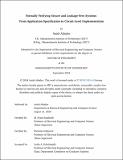Formally Verifying Secure and Leakage-Free Systems: From Application Specification to Circuit-Level Implementation
Author(s)
Athalye, Anish
DownloadThesis PDF (3.797Mb)
Advisor
Kaashoek, M. Frans
Zeldovich, Nickolai
Terms of use
Metadata
Show full item recordAbstract
Hardware and software systems are susceptible to bugs and timing side-channel vulnerabilities. Timing leakage is particularly hard to eliminate because leakage is an emergent property that can arise from subtle behaviors or interactions between hardware and software components in the entire system, with root causes such as non-constant-time code, compiler-generated timing variation, and microarchitectural side channels. This thesis contributes a new approach using formal verification to rule out such bugs and build systems that are correct, secure, and leakage-free.
This thesis introduces a new theory called information-preserving refinement (IPR) for capturing non-leakage in addition to correctness and security, implements a verification approach for IPR in the Parfait framework, and applies it to verifying hardware security modules (HSMs). Using Parfait, a developer can verify that an HSM implementation leaks no more information than is allowed by a succinct application-level specification of the device's intended behavior, with proofs covering the implementation's hardware and software down to its cycle-precise wire-I/O-level behavior.
This thesis uses Parfait to implement and verify several HSMs, including an ECDSA certificate-signing HSM and a password-hashing HSM, on top of Ibex and PicoRV32-based hardware platforms. Parfait provides strong guarantees for these HSMs: for example, it proves that the ECDSA-on-Ibex implementation—2,300 lines of code and 13,500 lines of Verilog—leaks nothing more than what is allowed by a 40-line specification of its behavior.
Date issued
2024-09Department
Massachusetts Institute of Technology. Department of Electrical Engineering and Computer SciencePublisher
Massachusetts Institute of Technology